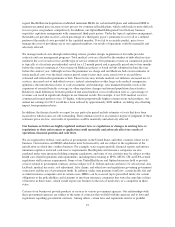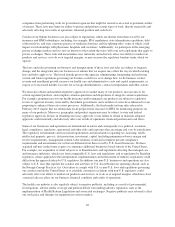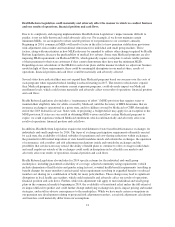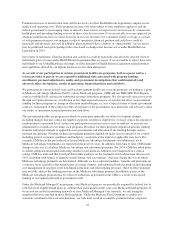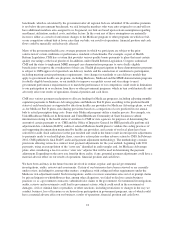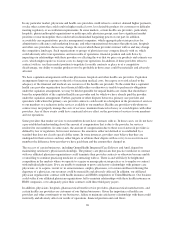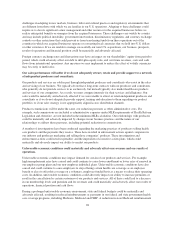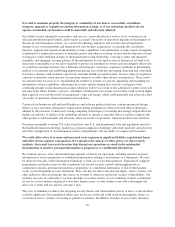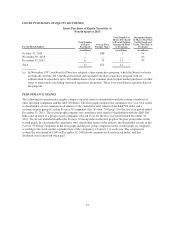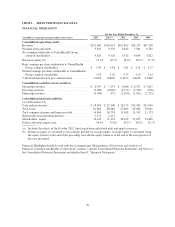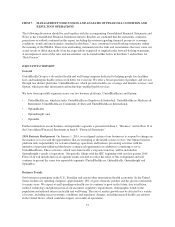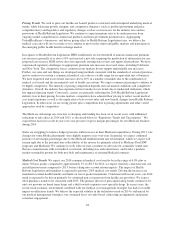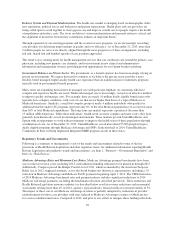United Healthcare 2013 Annual Report Download - page 31
Download and view the complete annual report
Please find page 31 of the 2013 United Healthcare annual report below. You can navigate through the pages in the report by either clicking on the pages listed below, or by using the keyword search tool below to find specific information within the annual report.rates could be implemented retrospectively to apply to payments already negotiated and/or received from the
government and could materially and adversely affect our results of operations, financial position and cash flows.
In addition, state and federal budgetary pressures could cause the affected governments to impose new or a
higher level of taxes or assessments for our commercial programs, such as premium taxes on insurance
companies and HMOs and surcharges or fees on select fee-for-service and capitated medical claims. Any of these
developments or actions could materially and adversely affect our results of operations, financial position and
cash flows.
A prolonged unfavorable economic environment also could adversely impact the financial position of hospitals
and other care providers, which could materially and adversely affect our contracted rates with these parties and
increase our medical costs or materially and adversely affect their ability to purchase our service offerings.
Further, unfavorable economic conditions could adversely impact the customers of our Optum businesses,
including health plans, HMOs, hospitals, care providers, employers and others, which could, in turn, materially
and adversely affect Optum’s financial results.
Our investment portfolio may suffer losses, which could materially and adversely affect our results of
operations, financial position and cash flows.
Market fluctuations could impair our profitability and capital position. Volatility in interest rates affects our
interest income and the market value of our investments in debt securities of varying maturities, which comprise
the vast majority of the fair value of our investments as of December 31, 2013. Relatively low interest rates on
investments, such as those experienced during recent years, have adversely impacted our investment income, and
the continuation of the current low interest rate environment could further adversely affect our investment
income. In addition, a delay in payment of principal and/or interest by issuers, or defaults by issuers (primarily
from investments in corporate and municipal bonds), could reduce our net investment income and require us to
write down the value of our investments, which could materially and adversely affect our profitability and
shareholders’ equity.
There can be no assurance that our investments will produce total positive returns or that we will not sell
investments at prices that are less than their carrying values. Changes in the value of our investment assets, as a
result of interest rate fluctuations, changes in issuer financial conditions, illiquidity or otherwise, could have an
adverse effect on our shareholders’ equity. In addition, if it became necessary for us to liquidate our investment
portfolio on an accelerated basis, such an action could have a material adverse effect on our results of operations
and the capital position of regulated subsidiaries.
If the value of our intangible assets is materially impaired, our results of operations, shareholders’ equity
and credit ratings could be materially and adversely affected.
Goodwill and other intangible assets were $35.4 billion as of December 31, 2013, representing 43% of our total
consolidated assets. We periodically evaluate our goodwill and other intangible assets to determine whether all or
a portion of their carrying values may be impaired, in which case a charge to earnings may be necessary. For
example, the manner in or the extent to which Health Reform Legislation is implemented may impact our ability
to maintain the value of our goodwill and other intangible assets in our business. Similarly, the value of our
goodwill may be materially and adversely impacted if businesses that we acquire perform in a manner that is
inconsistent with our assumptions. In addition, from time to time we divest businesses, and any such divestiture
could result in significant asset impairment and disposition charges, including those related to goodwill and other
intangible assets. Any future evaluations requiring an impairment of our goodwill and other intangible assets
could materially and adversely affect our results of operations and shareholders’ equity in the period in which the
impairment occurs. A material decrease in shareholders’ equity could, in turn, adversely impact our credit ratings
and potentially impact our compliance with the covenants in our bank credit facilities.
29


